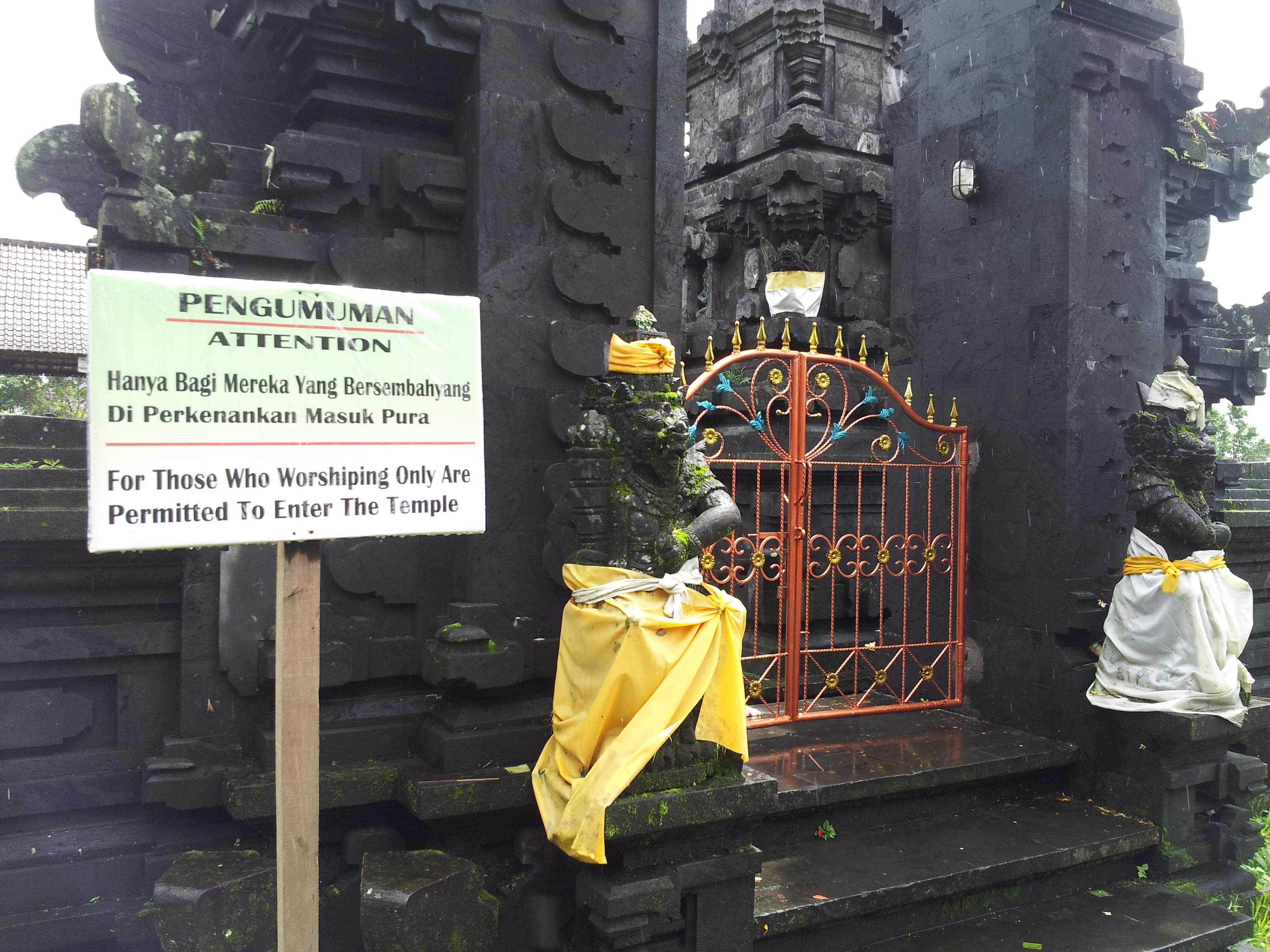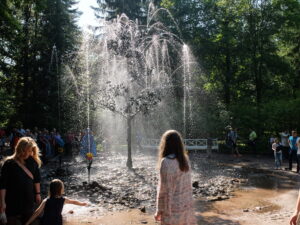
I first visited castles along the Rhine with my sons in the late 80s. At a restaurant, I tried to order food with the little German I knew at the time. When the waiter left, my older son observed with great amusement that I had been speaking German while the German waiter was speaking English back to me. Even then we were aware of the benign curse of the spread of English as the go-to second language around the world.
After visiting dozens and dozens of countries in the three decades since, across all the continents, we’ve found the great wave of English inundating the world.

Paris, for example, has long been considered a place of major resistance, the Maginot line of French standards. But, even here, the great tourist onslaught by the British chunneling over and Americans wanting to soak in Parisian charms have changed things.
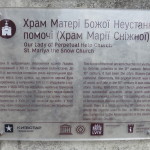
Not that Parisians don’t relish a good French speaker, but now so many quickly switch to English when you show yourself somewhat less than native. We needed some items in a pharmacy during our most recent stay in Paris. We asked for them in French, our best second language, but immediately got English in response. The same at restaurants way off the tourist track. The once obdurate French now feel they need to welcome visitors and accommodate them – as good hosts as well as per good business practice. And decades of children learning English in school have expanded their ability to do so.
In the St. Germain area during the same trip, we laughed and lamented over how Anglicized the place had become. Even the restaurants there now announce, “Authentic French Food,” presumably so you can sort it out from the kebabs, pizza and Italian offerings along the street. Just as in Prague, though, where the inner region is filled with restaurants announcing “Authentic Czech Food,” you would be gastronomically wise to go elsewhere.
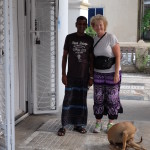
And so it goes. In most tourist destinations, you can usually survive the language gap with nothing more than English in your verbal portfolio. Even in hostels, backpackers from disparate nations inevitably resort to English as a way to connect. And, even in untouristy Dhaka, Bangladesh, we found ourselves guided in English by the caretaker of an obscure Armenian Church.
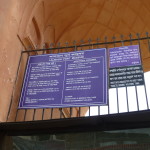
It’s no mystery how this came about. The colonizing Brits started it of course. In the US, we’d all be speaking Navajo or Spanish otherwise. With Britain’s occupation of countries across Asia, especially in India, as well as in Africa, and the spread of its vital economic power into the 20th century, English became an important global trading language. Then, from the mid-nineteenth century on, American economic influence, and its appeal as a land of freedom to people troubled by imperial rule, war and other modern afflictions did the rest. Even in Vietnam, where French had been the colonizing language, and the US lost to the Communists, the young have been turning to English as their second language for nearly 50 years.
Now more than ever American cultural exports bring English into city and country. Hollywood sells big overseas, with movies often undubbed in the original language. American music – from country to rock to blues and pop – invade ears everywhere. At our gym in Zagreb, the soundtrack to the workouts are in English only. VH1 runs on the TVs. In Prague, the rock stations did sprinkle Czech songs in their mix, but half were born in the USA.
Even global corporations outside the US have resorted to using what they find is the one international language, switching their common corporate tongue to English.
The flood of English is surely a blessing for native speakers who travel. But we’ve found that its ubiquity is also a curse. You lose a lot if you don’t make the effort to speak in the local language. Here are our main reasons for doing so:
- Mental fitness –
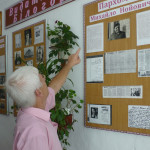
No English – Ukrainian village school teacher talks about notable residents Without doubt learning even the rudiments of a language challenges the brain. A recent study showed how mentally nimble Indian citizens have become because they deal in multiple languages just within their country. Other studies have shown the advantages for bilingual speakers in forestalling dementia and other mentally debilitating illnesses. After we took six hours of Hindi lessons at the start of our six months stay in India, surprisingly we found ourselves speaking French better.
- Goodness for the soul –The more you understand and can express yourself, the more you can delve into the culture you’re visiting – and curry friendships. We spent six months in central Italy, often purchasing fresh produce from a large stand within a local farm. As our Italian improved, we progressively bonded with the farmer woman in charge. By the time we left, she offered us hugs, bags of fruit and a tearful farewell to send us on our way. In Delhi, we connected with a local street produce vendor who spoke no English.

Questioned by students of English – Jogjakarta Even in mundane interactions – with waitstaff, drivers, shop owners, etc. – you gain a lot from just trying to speak in the native tongue, largely because little is expected of us visitors. All it takes to start is a handful of key phrases and words to make good things happen. What we uncover from those we meet around the globe are smiles, giggles of surprise, and more language lessons.
Plus – putting aside their bemused comments about how much “we know the language” – a palpable appreciation of our gracious behavior as a guest in their country.
- Utility –
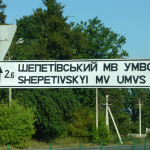
No English – Ukrainian only on country road signs We regularly go to open air markets for produce and local stores for staples. It’s an uphill slog in these without some basics in the language – numbers for negotiating, names of products to ask for, or the components of food products to scrutinize. We have sorted out many products once we knew that the Croatian word for “fat” is Mast and that it’s Tuk in Czech, or learned what dairy product is sour cream and what cottage cheese.
- Help in a pinch –Though English has spread far, you can get a bit complacent relying on it. We have found that there are limits: usage tends to dry up the further you get from the main tourist destinations, and in atypical situations.
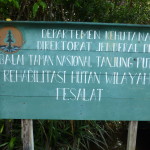
No English – Borneo national park Early on in Prague, we decided to take the bus to Konopiste Castle an hour or so out of town. The organization of the far-flung bus station we found at the end of the Metro was pretty confusing. And we found no one who could help us in English. At least we could keep asking directions till we got positive responses.
On the other hand, we were fortunate at Sumatra’s Samosir Island that a clinic manager could tell us how to tend our wounds after a motor scooter spill. Till then we had been relying on guides to handle the Bahasa tongue, but we were on our own at this point. However, Samosir is an island that attracts many visitors. We recognized we would not be so lucky getting help if our accident had occurred farther afield.

Fortunately, travelers now have so many tools beyond those old Berlitz guides for handy phrases, the ones ironically with endless pages on how to deal with things gone very wrong in travel. Online lessons are widely available. We loved the Hindi site at learning-hindi.com; now we’re trying out a number of sites to work on Croatian. Dictionaries and a myriad of lexicon apps abound. Google Translate gives immediate help with language needs, and can even act as a kind of simultaneous translator by taking dictation from both sides of a conversation. But these are mainly backup and learning tools, not quite fit for normal conversation. The main event is the talk.
So how should you get started on a language? Here’s a six hour plan for getting going.
- Be literate: learn the alphabet; check how the vowels and consonants sound. Use online tools to hear a native speaker articulate letters and words.
- Memorize the essentials: hello, goodbye, thank you, you’re welcome, please, numbers, directions, and so on.
- Then learn the basics of grammar to get to sentence construction: noun endings, verb present tense and some prepositions.
- Start adding vocabulary with essential nouns, verbs and adjectives, those a five year old would use: verbs, for example, such as want, have, need, come, go. Add more over time.
The comfort for most speakers of English is that they will fare pretty well in their travels with little knowledge of another language. But this is cold comfort indeed. As we keep finding in our travels, learning how to communicate as well as possible in the native language will add great value and satisfaction. You’ll even find yourself empowered to step off the tourist track and follow some roads less traveled by.


